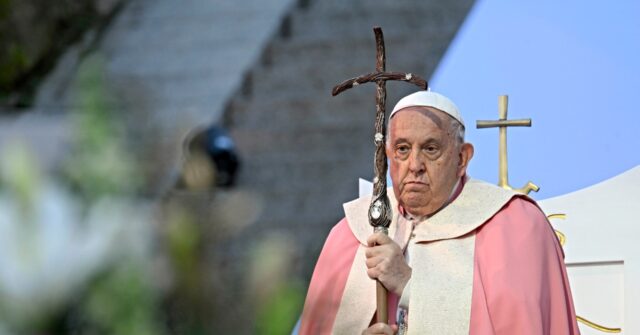The approval rating of Pope Francis among American adults has significantly decreased, reaching its lowest point since his election in 2013, according to a recent Rasmussen report. In early December, only 41 percent of American adults expressed a favorable impression of the Pope, a stark decline from 61 percent in 2013. Furthermore, the number of people viewing him unfavorably has risen to 31 percent, nearly threefold the 12 percent unfavorability rating he had at the start of his papacy. The survey revealed contrasting opinions along party lines, where a majority of Democrats (53 percent) hold a favorable view of Francis, while only 36 percent of Republicans and 34 percent of independents share that sentiment. About 28 percent of respondents stated they were unsure about their opinion of the Pope.
Various reasons have been suggested for this decline in popularity, although Rasmussen does not elaborate on possible causes. Dr. Bill Donohue, president of the Catholic League for Religious and Civil Rights, provided insights into the situation based on recent findings from the Pew Research Center. He noted that the Pope’s endorsement of civil unions and blessings for homosexual couples has drawn significant criticism from both clergy and laypeople globally. This change in direction has caused consternation among some traditionalist Catholics who feel that these moves deviate from longstanding church teachings.
Additionally, Donohue raised concerns regarding Pope Francis’s appointments and decisions, including the controversial choice of Cardinal Victor Manuel Fernández to lead the Vatican’s doctrinal office, despite Fernández’s lack of a strong theological background. He also criticized the Pope’s decision to retain Fr. Marco Rupnik, who faced allegations of sacrilegious and sexual offenses, as well as his handling of Bishop Gustavo Zanchetta, who was found guilty of sexually abusing seminarians but remained in good standing. These actions, along with Francis’s restrictive measures on the Latin Mass, have led many faithful Catholics to view his leadership negatively, contributing to the erosion of his public favorability.
Recent actions by the Pope, including his stance on the Israel-Gaza conflict and the appointment of openly pro-LGBTQ+ clerics, have further alienated some of the church’s base. His call for an investigation into whether Israel’s actions might constitute genocide has drawn ire from certain quarters, while naming a notorious LGBTQ+ activist as a cardinal has compounded concerns. The Pope’s continued emphasis on climate change as a paramount global challenge has also left many Catholics puzzled, as they grapple with the implications of his leadership choices amidst social and political controversies.
The Rasmussen report also highlighted a public disapproval of Francis’s decision to skip the reopening ceremony of Notre Dame Cathedral in Paris on December 8. This event, which was attended by prominent global leaders and figures, marked a significant moment following the cathedral’s 2019 fire. Francis’s choice to visit the French island of Corsica instead drew mixed reactions, with only 27 percent of U.S. adults approving of his decision, while 39 percent disapproved. This lack of consensus indicates that the papacy’s relationship with the public could continue to be tumultuous moving forward.
As Pope Francis navigates his papacy in a rapidly changing and often polarized world, his declining popularity may reflect broader challenges within the church and society itself. The divergence in views among different demographics underscores not only the varied expectations congregants hold for their spiritual leader but also the complexities faced by Francis as he attempts to address contemporary societal issues while remaining true to the church’s doctrines. The trends observed may serve as a barometer for Francis’s influence and the Catholic Church’s direction in an era marked by shifting cultural values and increased scrutiny of its leadership.

